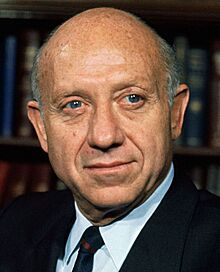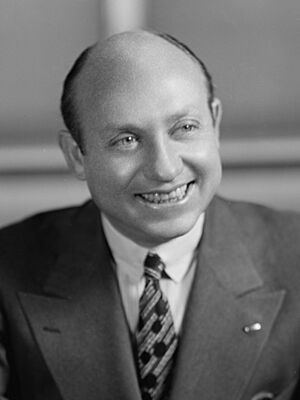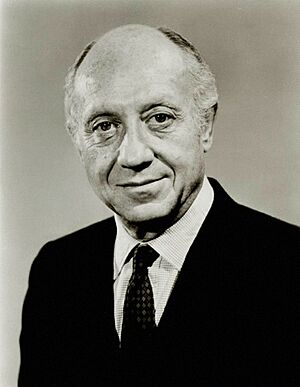Jacob Javits facts for kids
Quick facts for kids
Jacob Javits
|
|
|---|---|

Javits in 1966
|
|
| United States Senator from New York |
|
| In office January 9, 1957 – January 3, 1981 |
|
| Preceded by | Herbert Lehman |
| Succeeded by | Al D'Amato |
| 58th Attorney General of New York | |
| In office January 1, 1955 – January 9, 1957 |
|
| Governor | W. Averell Harriman |
| Preceded by | Nathaniel L. Goldstein |
| Succeeded by | Louis Lefkowitz |
| Member of the U.S. House of Representatives from New York's 21st district |
|
| In office January 3, 1947 – December 31, 1954 |
|
| Preceded by | James H. Torrens |
| Succeeded by | Herbert Zelenko |
| Personal details | |
| Born |
Jacob Koppel Javits
May 18, 1904 New York City, U.S. |
| Died | March 7, 1986 (aged 81) West Palm Beach, Florida, U.S. |
| Resting place | Linden Hills Jewish Cemetery, New York City, U.S. |
| Political party | Republican |
| Other political affiliations |
Liberal |
| Spouse |
Marian Ann Borris
(m. 1947) |
| Relations | Jacob Emden (ancestor) Eric M. Javits (nephew) |
| Children | 3 |
| Alma mater | Columbia University (BA) New York University (LLB) |
| Signature |  |
| Military service | |
| Allegiance | |
| Branch/service | |
| Years of service | 1942–1946 |
| Rank | |
| Unit | Chemical Corps |
| Battles/wars | World War II |
Jacob Koppel Javits (born May 18, 1904 – died March 7, 1986) was an American lawyer and politician. He represented the state of New York in the House of Representatives and the Senate. He also served as New York's top lawyer, the Attorney General.
Javits was a member of the Republican Party. However, he was known as a "liberal Republican," meaning his political views were often more progressive than many in his own party. He supported labor unions, social programs like the Great Society, and the civil rights movement. He helped pass important laws that protected civil rights. Javits was also against the Vietnam War and helped create the War Powers Resolution in 1973. This law limits how long a president can send troops into combat without Congress's approval.
Born to a Jewish family, Javits grew up in a crowded apartment building called a tenement in Manhattan, New York City. He studied law at New York University School of Law and started his own law firm. During World War II, he served in the United States Army. Javits was upset by the corruption in New York City politics, especially with a group called Tammany Hall. He joined the Republican Party and supported Fiorello H. La Guardia, who was the Mayor of New York City.
Javits was elected to the House of Representatives in 1946. He served there until 1954. In the House, he supported President Harry S. Truman's foreign policy during the Cold War. He also voted to fund the Marshall Plan, which helped rebuild Europe after the war. In 1954, he became the Attorney General of New York. Then, in 1956, he won the election to become a U.S. Senator.
As a Senator, Javits supported many of President Lyndon B. Johnson's "Great Society" programs. These programs aimed to reduce poverty and racial injustice. He also supported major civil rights laws, such as the Civil Rights Act of 1964 and the Voting Rights Act of 1965. He initially supported the Gulf of Tonkin Resolution regarding the Vietnam War, but later questioned how the war was handled. To limit the president's power in starting wars, Javits helped create the War Powers Resolution. He also sponsored the Employee Retirement Income Security Act, which protects private retirement plans.
In 1980, Javits lost the Republican primary election for Senate to Al D'Amato. Even though he lost, he ran in the main election as a candidate for the Liberal Party of New York. He and another candidate, Elizabeth Holtzman, were both defeated by D'Amato. Javits passed away in 1986 from amyotrophic lateral sclerosis, also known as Lou Gehrig's Disease.
Early Life and Education
Jacob Javits was born on May 18, 1904, in New York City. His parents were Ida and Morris Javits, who were Jewish. He grew up in a very crowded apartment building on the Lower East Side of Manhattan. When he wasn't in school, he helped his mother sell goods from a pushcart on the street. He also learned about how meetings and debates work at a community center.
Javits finished George Washington High School in 1920. He was even the president of his class! He worked different part-time jobs while going to night school at Columbia University. In 1923, he started at New York University Law School and earned his law degree in 1926. He became a lawyer in 1927 and joined his older brother, Benjamin, to form their own law firm. They became very successful.
In 1947, Jacob Javits married Marian Ann Borris. They had three children together. When World War II began, Javits was considered too old for regular military service. However, he joined the U.S. Army's Chemical Warfare Service in 1942. He served throughout the war and became a lieutenant colonel.
Start of Political Career
When he was young, Javits saw how his father worked for Tammany Hall, a powerful political group in New York City. He saw firsthand the corruption and unfair practices linked to this group. This experience made Javits dislike the city's Democratic Party. In the early 1930s, he joined the Republican Party and supported Fiorello H. La Guardia in his campaigns for mayor.
After the war, Javits worked hard as a researcher for a mayoral candidate in 1945. His dedication showed he had a lot of potential in politics. In 1946, the Manhattan Republican Party nominated him to run for a seat in the United States House of Representatives. Even though Republicans hadn't won that seat in a long time, Javits campaigned with a lot of energy and won. He was part of a new group of representatives that included John F. Kennedy and Richard M. Nixon. He served in the House from 1947 until 1954.
During his time in the House, Javits often agreed with President Harry S. Truman's government. For example, in 1947, he supported Truman's decision to reject the Taft-Hartley Bill, which Javits believed was unfair to labor unions. Javits was strongly against discrimination. He supported laws to ban the poll tax, which was a fee people had to pay to vote. He also tried to pass a bill to stop racial segregation in housing projects funded by the government.
Javits was not happy with the intense investigations happening in Washington during the Cold War. He publicly opposed giving more money to the House Un-American Activities Committee, which was investigating people suspected of being disloyal. Javits always strongly supported Israel. He served on the House Foreign Affairs Committee and supported funding for the Marshall Plan and the Truman Doctrine, which were programs to help other countries.
In 1954, Javits ran for New York State Attorney General. He won, even though his opponent, Franklin Delano Roosevelt Jr., was very well-known. Javits was the only Republican to win a statewide office that year. As Attorney General, he continued to support his progressive ideas. He backed laws against unfair employment practices and a health insurance program for state employees.
Serving as a U.S. Senator
In 1956, Jacob Javits ran for U.S. Senator from New York. He won against the popular Mayor of New York, Robert F. Wagner Jr.. Javits became a Senator on January 9, 1957. For the next 24 years, the Senate was his main focus. His wife preferred to live in New York, so Javits traveled between New York and Washington, D.C., almost every week.
In foreign policy, he supported the Eisenhower Doctrine for the Middle East. He also pushed for more financial and military help for other countries. Javits was re-elected as Senator in 1962 and 1968.
Javits voted for important Civil Rights Acts in 1957, 1960, 1964, and 1968. He also supported the 24th Amendment, which banned poll taxes. He voted for the Voting Rights Act of 1965, which protected the right to vote for all citizens. He also supported the appointment of Thurgood Marshall to the U.S. Supreme Court.
He endorsed President Lyndon Johnson's "Great Society" programs, which aimed to improve society through social reforms. Javits served on the Senate Labor and Human Resources Committee for 20 years. He initially supported Johnson's actions in the Vietnam War, including the Gulf of Tonkin Resolution in 1964. However, he later changed his mind and opposed the war. In 1964, Javits also helped start the International Executive Service Corps. This group helps developing countries grow their businesses.
Javits supported the idea of universal healthcare. In 1970, he proposed a bill called "Medicare for All." This bill would have expanded the Medicare program to cover all American citizens.
By the end of 1967, Javits became more and more against the Vietnam War. He joined 22 other senators in asking for a peaceful solution to the conflict. In 1970, he supported a measure to stop funding for U.S. troops in Cambodia. He also voted to cancel the Gulf of Tonkin Resolution. Javits was concerned that Congress was losing its power in foreign affairs. So, he sponsored the 1973 War Powers Act. This law limits a president's power to send American troops into combat for more than 60 days without Congress's approval.
In 1965, Javits made history by appointing Lawrence Wallace Bradford Jr. as the Senate's first African-American page. In 1971, he appointed Paulette Desell as the Senate's first female page.
Even though he disagreed with President Richard Nixon about the Vietnam War, Javits was slow to join those who opposed Nixon during the Watergate scandal (1973–1974). He believed Nixon was innocent until proven guilty through legal processes. This position was not popular with some of his supporters. In the 1974 election, he won by a smaller margin than before. During his last term, Javits focused more on world affairs, especially in the Middle East. He worked with President Jimmy Carter and traveled to Israel and Egypt. He helped with the discussions that led to the 1978 Camp David Accords, a peace agreement between Israel and Egypt.
1980 Senate Election
In 1979, Javits was diagnosed with amyotrophic lateral sclerosis (ALS), also known as Lou Gehrig's Disease. This illness led to a challenge in the 1980 Republican primary election by Al D'Amato. D'Amato won the primary. Javits's illness and the Republican Party's shift towards more conservative views contributed to his loss.
After losing the primary, Javits decided to run in the general election as the candidate for the Liberal Party of New York. His running split the votes among those who might have supported the Democratic candidate. This helped Al D'Amato win the election. Javits received 11% of the votes.
Later Life and Legacy
Jacob Javits passed away from ALS in West Palm Beach, Florida, in March 1986, at the age of 81. He was survived by his wife, Marian Ann Borris Javits, and their three children: Joshua, Carla, and Joy. His nephew, Eric M. Javits, became a diplomat. Jacob Javits is buried at Linden Hill Jewish Cemetery in Queens, New York.
Many people attended Javits's funeral service in Manhattan, including former President Richard Nixon, governors, mayors, and other important figures.
Throughout his time in Congress, Javits was known for his independent thinking. He was very proud of his work in creating the National Endowment for the Arts. He also sponsored the ERISA law, which protects private retirement plans, and led the effort to pass the 1973 War Powers Act. In 1966, a group called Americans for Democratic Action gave him a 94% rating, showing how liberal his views were.
Javits used his position to promote new ideas, even those that supported the policies of Democratic presidents. He suggested that large international companies could work together to invest in Latin America. This idea was meant to support President John F. Kennedy's "Alliance for Progress." Later, many companies formed the Adela Investment Company, just as Javits had suggested.
Javits was part of a small group of liberal Republicans in Congress. He often had different opinions from his more mainstream Republican colleagues. He was a strong supporter of labor unions and civil rights. One study found that Javits was the most liberal Republican to serve in Congress between 1937 and 2002. He believed that both political parties should allow for different opinions. Javits also saw himself as following the traditional Republican ideas of leaders like Abraham Lincoln, who supported a strong federal government.
In an essay published in 1958, Javits predicted that the first African-American president would be elected by the year 2000. He sponsored the first African-American Senate page in 1965 and the first female page in 1971.
Javits played a big role in creating laws that protected people's pensions. He also led the effort to pass the Javits-Wagner-O'Day Act, which helps people with disabilities find jobs. He became the highest-ranking minority member on the Committee on Foreign Relations. He was also one of the first and most important leaders in passing laws to support education for gifted students. Many people know his name from the federal Jacob Javits Grants that help gifted and talented students.
Honors and Commemoration
Jacob Javits received the Presidential Medal of Freedom in 1983. This is one of the highest civilian awards in the United States.
Several places and awards are named in his honor:
- The Jacob K. Javits Convention Center in New York City was named after him in 1986.
- A playground in Fort Tryon Park in New York City is named after him.
- The Jacob K. Javits Federal Building in Manhattan is named after him.
- A lecture hall at Stony Brook University on Long Island is also named after him.
- The Jacob K. Javits Gifted and Talented Students Education Act of 1988 helps fund programs for gifted and talented students.
- The United States Department of Education gives out Javits Fellowships to graduate students.
- The National Institutes of Health gives the Javits Neuroscience Investigator Award to talented researchers studying brain disorders.
- NYU started the Jacob K. Javits Visiting Professorship in 2008.
Images for kids
See also
- List of Jewish American jurists
- List of Jewish members of the United States Congress




